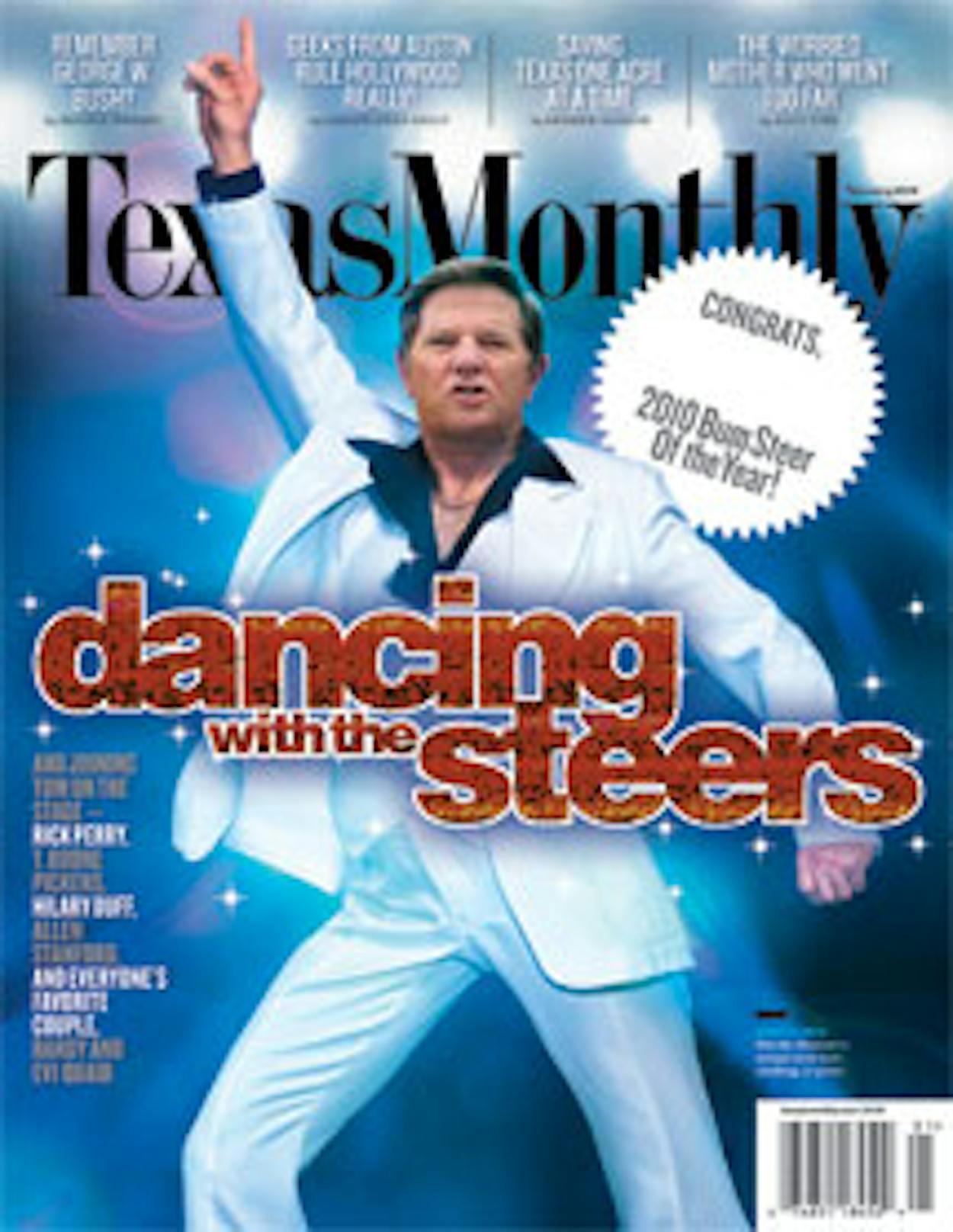After picking up the mail and happily opening Christmas cards, I looked down and saw Tom DeLay on the cover of texas monthly [January 2010]. I almost threw up. But as I read that it was time for the Bum Steer Awards, I just thought, “What a great choice.” Kudos to you all.
Donna Kelly
Houston
Natural Wonders
Andrew Sansom’s feature “Lands That I Love” moved me beyond belief [January 2010]. As a native Texan, born in El Paso and raised in Houston, I grew up watching the ultimate demise of many of Texas’s beloved plains, lakes, and rivers. I remember as a young child spending countless weekends at a friend’s farm in Westphalia, watching the sun come up over vast cotton fields filled with the coos of mockingbirds and mourning doves. In college in San Marcos in the seventies, I remember spending endless days swimming and hiking along Barton Creek and the San Marcos River. The travesty of overdevelopment and suburban sprawl in the Hill Country eventually drove me away, and I now reside in Colorado and Montana, where I am committed to conservation projects to hopefully prevent the same thing from happening in these beautiful bastions of the Western landscape. Kudos to people like Gay Dahlstrom, Buddy Temple, and Jarid Manos, who are determined to protect the last vestiges of Texas beauty. I pray for my beloved state, that people will wake up and vote against further corporate development before it is too late.
Victoria Finch
Lafayette, Colorado
Ken Burns’s recent film series about the national parks included a quote from a woman who proudly boasted that America did not have to depend on “some rich nobleman” to set aside places where nature was available for the public. In her America, it was “all for one and one for all” when it came to the deep benefits available in nature’s quiet beauty—at a minuscule cost to each of us. Not only in Texas, but in modern America, such cooperation is termed “socialism,” and the mantra is “all for one, and that’d be me.”
I wish Andrew Sansom’s “Lands That I Love” would—finally!—start the conversation about What Benefits Us All, but the TCEQ [Texas Commission on Environmental Quality], under Rick Perry’s steady guidance, consistently fails to view environmental quality as a public benefit, choosing to award the favor of filth to developers, oil and gas companies, sports stars, or anyone who helps with the election. They will eventually leave the poisoned waste behind, seeking favors elsewhere.
God save those who honor the ground that is Texas. Even if we have to import them from up north.
John W. Davis
Santa Cruz, California
Return to Sender
I am curious about Brian D. Sweany’s disingenuous article “Post-Office” [January 2010]. In it he details unflattering opinions of the former president. It’s easy to sit in an office and pound out negative comments on someone. Maybe if Sweany ran for dogcatcher and had to make a few tough decisions I would have more respect for him.
Donna Keller
Valencia, California
Ranch Blessing
Mimi Swartz’s delicate and loving memorial to her mother and their history of clothing was simply beautiful [“What She Wore,” January 2010]. And Gary Cartwright’s piece on the Dobie Paisano Ranch and his relationship to J. Frank was interesting and comforting [“Ghost Writer,” January 2010]. Those of us who know the Paisano Ranch and who have read and studied Southwest literature on purpose appreciate the gift of the fellowship and the gift of Gary Cartwright’s abilities as a writer. Long may he and Mimi wave, at texas monthly and beyond.
Malinda Wilson
Orange
When I was a third-grade teacher in the late sixties, I had the privilege of having in my class the children of two Paisano fellows, A. C. Greene and José Cisneros. Besides having the honor of getting to meet these two gifted gentlemen and their wonderful families, our class was privileged to visit J. Frank Dobie’s ranch on several occasions. The students benefited from a unique trip away from the classroom and instinctively knew it was special. Thank you, Mr. Cartwright, for bringing Paisano to our attention. I agree that it should remain forever a haven for artists and writers. We all benefit.
Mary Lockwood Crouch
Austin
Battle Lines
Perhaps I misinterpreted the first paragraph of Ms. Swartz’s “Home Front Lines” [Behind the Lines, January 2010]. It appeared to me that she was intimating that the Fort Hood shooter was suffering from post-traumatic stress syndrome. Major Nidal Malik Hasan had never seen service outside the U.S. All indications are that he is an Islamic jihadist who committed mass murder, and any attempt to justify or relate his actions to the stress and suffering witnessed by our military in Iraq and Afghanistan is an insult.
Wallis Smith
via e-mail
Yes, Ms. Swartz, the Iraq and Afghanistan wars have shown America how to better take care of our returning warriors. But you are mistaken about the treatment that returning Vietnam vets were subjected to. The counterculture of America was full-blown and fully active in the sixties and seventies. They hated the war, they hated the warriors, and they hated America.
When I returned home, with the smell of burning jet propellant from the helicopter gunship I flew lingering in my nostrils, and walked through the San Francisco airport terminal, I did not receive the harassment from the flower children that other returning warriors experienced because I was carrying, in the open for all to see, a trophy Chicom rifle. But make no mistake about it. The counterculture was there hating, at full speed, the war, the warrior, and America.
If you have not yet noticed, the counter-culturites have grown up and now occupy the White House and much of Congress. And they still hate the war, any war; the warrior, any warrior; and America, the patriot’s dream.
Rod Whalen
Tyler







